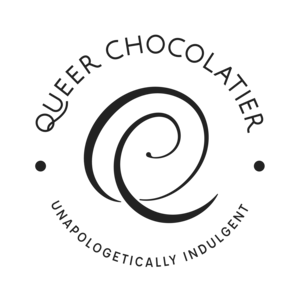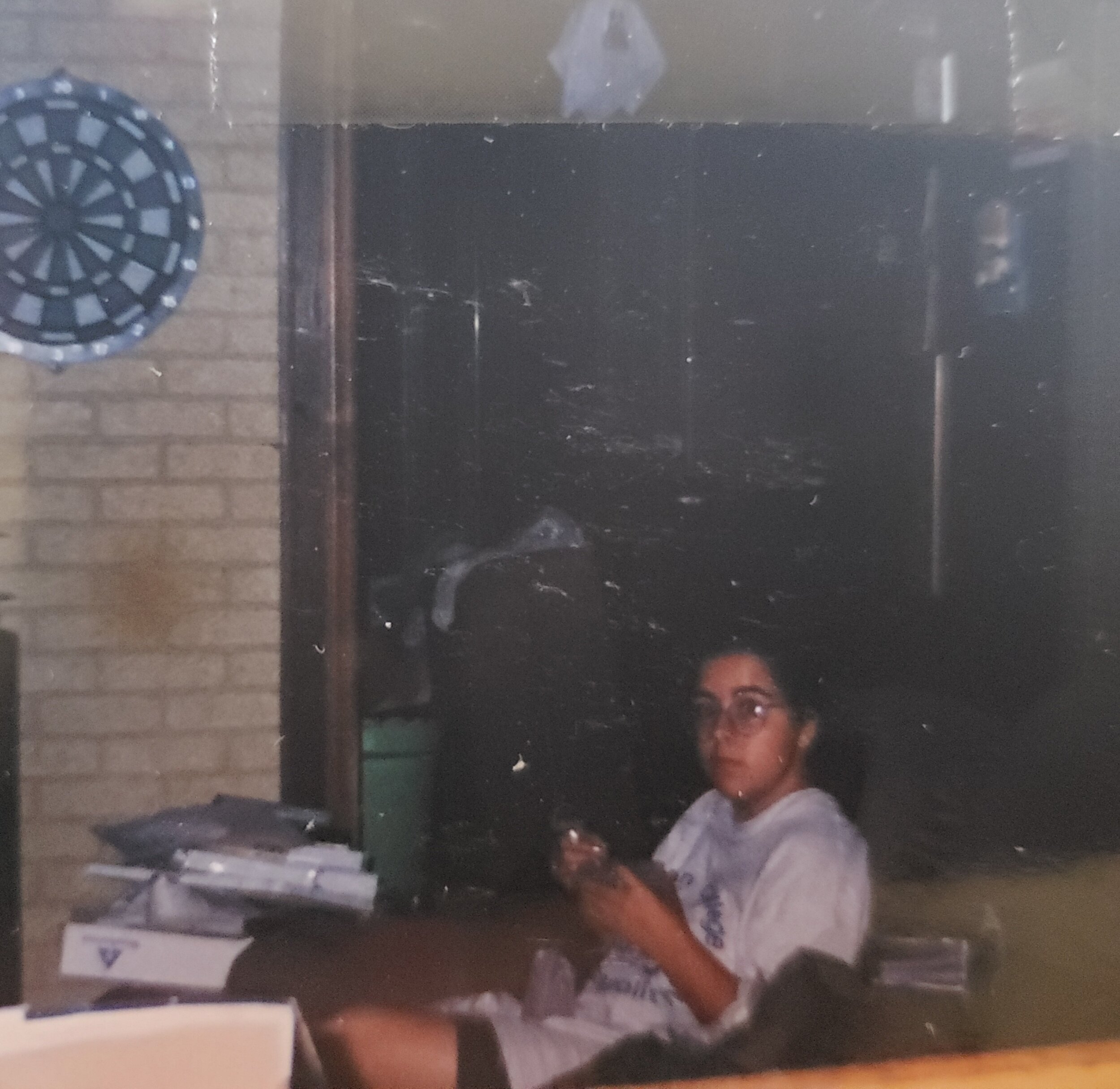MY story Of Coming Out
…doesn't really exist.
The closest thing to a coming out story I have to share is when I named my business Queer Chocolatier, which I’ll tell more of here in a moment.
Instead, I’ll share what it was like for me as a queer woman before being a queer businesswoman.
But, just before that, I want to stress that it is never incumbent upon anyone to have to come out, even on a day like today: National Coming Out Day.
The most important thing is your safety and if you would come into any immediate harm (i.e. physical violence, mental or emotional abuse, homelessness), weigh those risks carefully before deciding to come out. Maybe you decide to wait until those risks are minimized. Maybe you decide to live your most authentic life despite those risks and come out in spite of it all. Maybe, like many people, it is an ongoing process of sharing part of yourself to certain people in your life. Whatever the case may be, you’re no less queer and we need you in this world.
You’re in charge of your own story.
I never came out, or at least I don’t think i did?
From my experience growing up, I didn’t see a lot of examples of what relationships were like. My mom was a single parent who had me just a couple months before her twentieth birthday, her parents were divorced when I was three years old, and I am an only child so I didn’t have older siblings going out on dates. My uncle is married to a woman but they lived far away when I was a child. My aunt was not married but had friends with her when she would visit my grandpa's house and no one told me what that meant.
I didn’t know what it meant to be queer. Or straight. Or to have any attraction to people.
The only message I'd received was from my grandpa who said, upon my leaving the house to go out with friends, “Don’t get pregnant.” Mostly as a joke I’m sure, but also as a warning about what my future would be like if I were to become pregnant. I’d internalized the message, though, as “Don’t end up like your mother.” So, I never dated or kissed anyone throughout my entire teenaged years.
I do remember my first crush being on a boy in my class in high school. I remember simultaneously having my first celebrity crush on Shirley Manson of Garbage. I definitely had a bigger crush on her than the high school boy. I still crush on her, to be honest!
But, all throughout high school and middle school before that, I was teased pretty aggressively about how well I performed gender roles and fit into the screenplay of heteronormativity. In the hallway as I stood by my locker, kids would ask me whether I was a boy or a girl and snicker while inquiring. I suppose wearing baggy, threadworn clothing and having tangled, greasy hair made them more curious about my gender than my poverty and whether we had hot water at home to wash clothes or take a shower.
The living room of our trailer was also my bedroom from age 11-18.
This teasing came from my mother as well, but perhaps not in an expected way; she really pushed me to be a “tomboy" and had said on rare occasion that “raising a boy is easier than raising a girl,” (which, in my own view now, is less a commentary on what gender is easier to raise as much as there are more restrictions and boundaries to place on girls as they grow up). When a music teacher in middle school asked me to try out for choir, my mother’s primary concern was that I would have to wear a skirt and that would be “too girly.”
It's moments like these that painfully come right to the surface whenever I meet people now who knew me when I was younger and they say with self-satisfaction “I knew you were gay! I knew before you knew!”
But I’m not gay.
The overwhelming majority of my relationships and “relationships” have been with women. But I have also been attracted to people who are not women. To that end, I call myself bisexual
But, more accurately, I’m not particularly attracted to anyone unless I have a meaningful connection with that person. I’ve recently learned that this is called demisexual. As having grown up with no one expressing romantic or physical interest in me, it feels like I somehow developed in such a way as to prioritize my connections with people before becoming intimate with people. Maybe out of insecurity or out of protection or both.
There have been exceptions to this rule, sure, but I never had a relationship in which the other person didn’t express interest in me first, whatever their gender.
I never came out, however this is defined, as bisexual until anyone shot their shot. Essentially, the only people who ever really knew my sexuality for the vast majority of my life were the people I was having sex with.
At various points throughout my working career, a coworker here and there would tell me they were gay or lesbian and I would be appreciative of their telling me their story, but since I wasn’t dating anyone whenever these conversations came up, I never reciprocated about me. Plus, I figured why make their story about me in that moment? Perhaps it could have built a better friendship, but it never felt right because responding with “Cool, I’m bi!” while not dating (even though that’s a smidgen of bierasure of myself at that time).
Leaving Indiana
My first serious relationship was when I was 30. Earlier here, I'd shared that I had no relationships in my teenaged years, but my 20s was largely void of relationships as well, except for my early 20s while in college. When I was a 30 y/o graduate student, I started dating a woman who self-identified as stone butch and occasionally discussed her gender identity and expression as “steampunk.” I didn't hide my relationship but I would only discuss it whenever it came up in the course of conversation. The relationship was not healthy, so my lack of broadcasting my relationship was less shame-driven due to my sexuality as it was that I was really unhappy and unsure of how to get out of my situation.
It took graduating, the lease of our shared apartment ending, and moving to Pennsylvania after three months of couchsurfing for me to not only get out of that relationship but to start to emerge a bit more boldly about who I am and start over with no baggage to bring along with me.
When I left PA a year later, I was moving to Austin, Texas and starting a new relationship with a woman. The friends I made in ATX knew I was queer, but my coworkers at the as-you-may-have-guessed fairly conservative Texas Department of Agriculture didn't know until things in my relationship got bad and I’d be crying in my office. They cared about me and my well-being more than whether or not I was queer. I reflect upon their kindness quite often and miss them and Texas quite a bit. Surprisingly to some, in all my life leading up to that point, Texas was the place I’d felt safest in being more open with people about who I am.
getting married + coming out as Queer Chocolatier
When Cheri and I started dating in the fall of 2015 and got married soon after, this was not only the most open I had been about my sexuality but also the most actively political about it. Looking back on my trajectory, I can see that it took a combination of my own maturity and independence as well as a strong partner and a purpose for me to be able to live authentically.
Purpose came when the 2016 election yielded its results.
Cheri and I were traveling in the weeks before and after Election Day and we were in Austin on the way to the Davis Mountains in west Texas when we heard the news. The mood was bleak in Austin, and Cheri and I were glad to be heading to mountains and relative isolation to mentally and emotionally process. We understood that things were going to be tougher for queer people with the new administration.
Less than a year later, I launched Queer Chocolatier.
I was nervous about how I would be received in terms of both time (in the era of the current administration) and place (Muncie, Indiana).
Truly, this was as big of a coming out moment as I could imagine having. And I'm grateful for all the love and community I have found since coming out as a queer businesswoman! Being visible worked for me in this way and in this moment. Every moment that I step further out into the community to take up more space more visibly, the more that energy comes back to me and it builds upward and upward. From having a small table at farmers markets for people to come tell me their stories or to ask me questions on how to support those they love who are queer or trans to having a queer sober space at the Chocolate House where people would come on dates or young queer teens would bring their parents, the momentum just sweeps me up to do more and say more.
But in case it isn’t clear, let me say this:
My name is Morgan Roddy. I use she/her/hers pronouns. I'm queer and I sell chocolate. And I wish you a Happy and Proud National Coming Out Day, however you choose to celebrate it!




